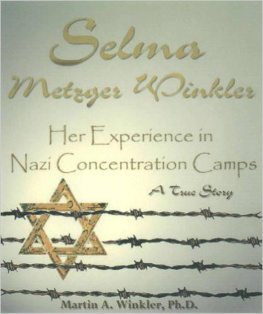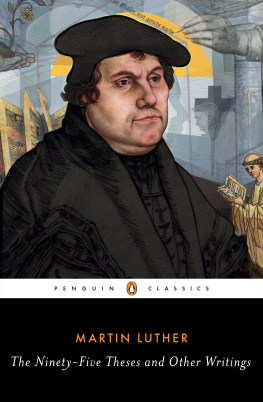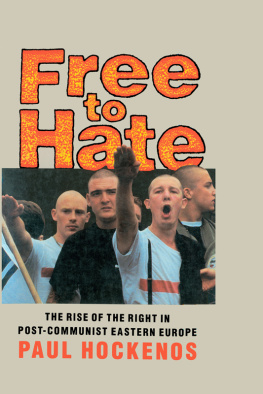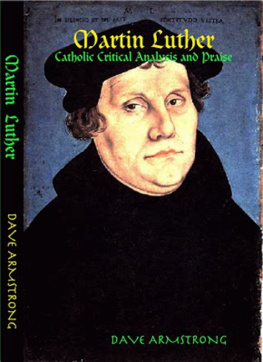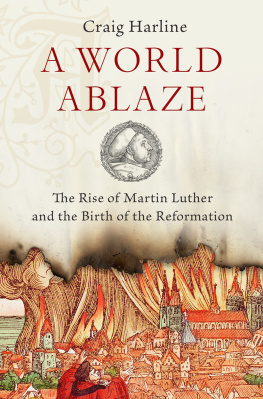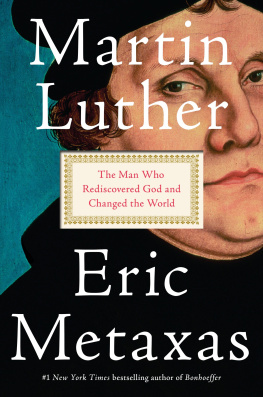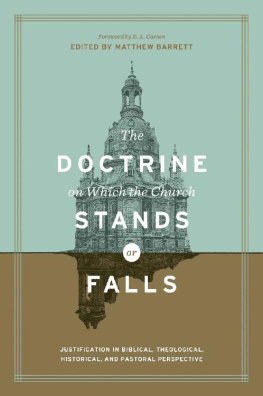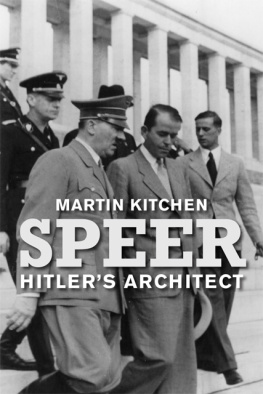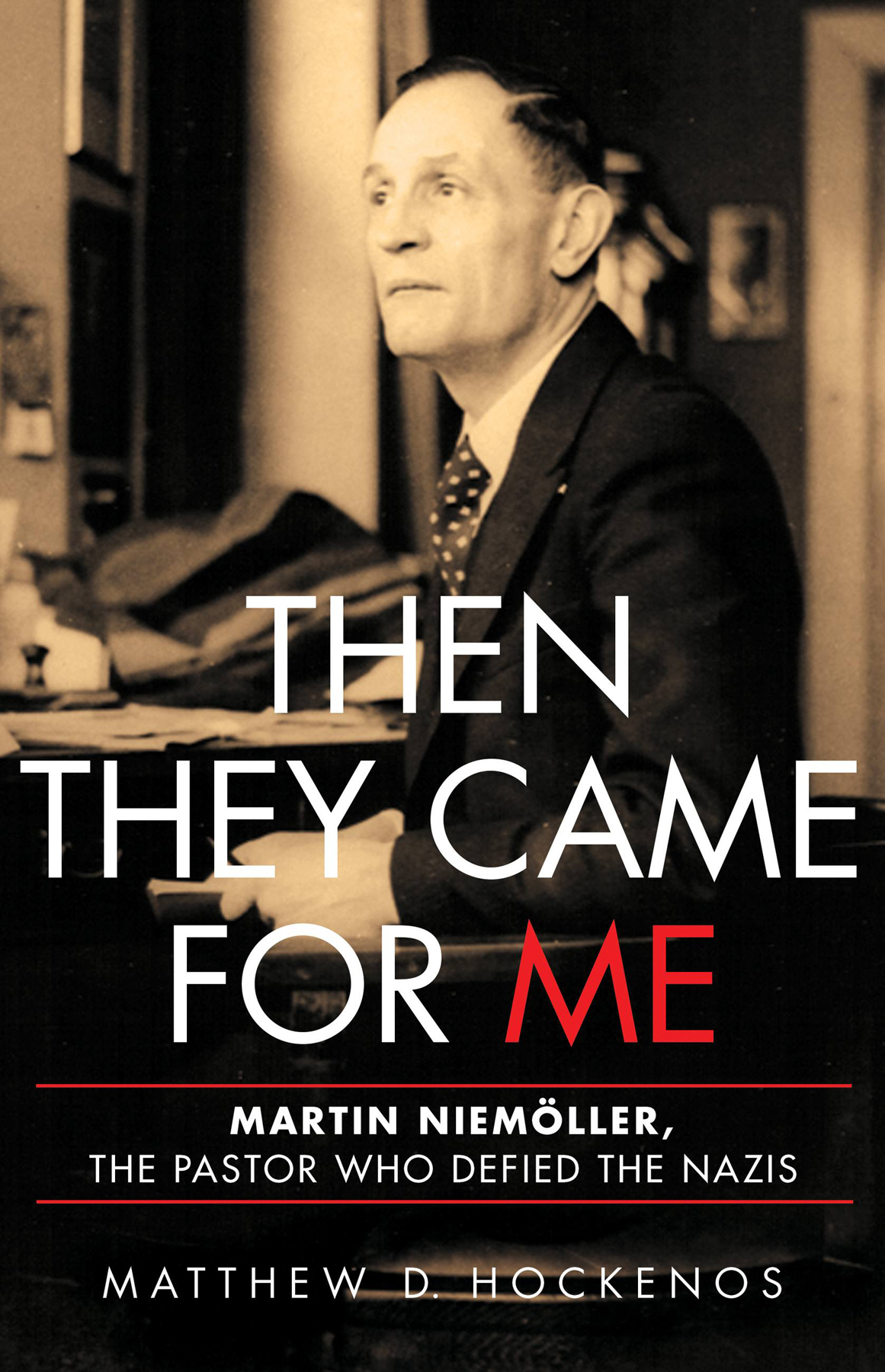Copyright 2018 by Matthew D. Hockenos
Hachette Book Group supports the right to free expression and the value of copyright. The purpose of copyright is to encourage writers and artists to produce the creative works that enrich our culture.
The scanning, uploading, and distribution of this book without permission is a theft of the authors intellectual property. If you would like permission to use material from the book (other than for review purposes), please contact permissions@hbgusa.com. Thank you for your support of the authors rights.
Basic Books
Hachette Book Group
1290 Avenue of the Americas, New York, NY 10104
www.basicbooks.com
First Edition: September 2018
Published by Basic Books, an imprint of Perseus Books, LLC, a subsidiary of Hachette Book Group, Inc. The Basic Books name and logo is a trademark of the Hachette Book Group.
The Hachette Speakers Bureau provides a wide range of authors for speaking events. To find out more, go to www.hachettespeakersbureau.com or call (866) 376-6591.
The publisher is not responsible for websites (or their content) that are not owned by the publisher.
The Library of Congress has cataloged the hardcover edition as follows:
Names: Hockenos, Matthew D., 1966 author.
Title: Then they came for me : Martin Niemoller, the pastor who defied the Nazis / Matthew D. Hockenos.
Description: First edition. | New York : Basic Books, 2018. | Includes bibliographical references and index.
Identifiers: LCCN 2018008433 (print) | LCCN 2018022869 (ebook) | ISBN 9780465097876 (ebook) | ISBN 9780465097869 (hardcover)
Subjects: LCSH: Niemoller, Martin, 1892-1984. | Lutheran ChurchGermanyClergyBiography. | Bekennende Kirche.
Classification: LCC BX8080.N48 (ebook) | LCC BX8080.N48 H63 2018 (print) | DDC 284.1092 [B]dc23
LC record available at https://lccn.loc.gov/2018008433
ISBNs: 978-0-465-09786-9 (hardcover), 978-0-465-09787-6 (ebook)
E3-20180804-JV-NF
A well-told story of faith, personal courage and repentance that speaks to a nations journey through delusion and horror to contrition. With skill that weaves his deep research and knowledge of German history into a finely-knit biography, Matthew Hockenos takes us swiftly through Martin Niemllers nine decades, from his origins in a family of monarchist, anti-Semitic, Lutheran ministers through his career as a naval officer and U-boat commander, from his early support for the Nazis to his disillusionment and 8 years in concentration camps through his evolution into a pacifist icon and moral authority in turbulent post-war Germany.
E THAN M ICHAELI , author of The Defender
In this engaging biography, Matthew Hockenos explores the many lives of Martin Niemller as he evolved from U-boat captain to clergyman to critic of Hitler to defender of the German people. Combining historical empathy with honest critical analysis, Matthew Hockenos masterfully demonstrates how a deeply flawed religious activist challenged an authoritarian political leader and changed the course of history.
M ATTHEW A. S UTTON , author of American Apocalypse
A Church Divided: German Protestants Confront the Nazi Past
For Alexandra and Oscar
In memory of Warren J. Hockenos (19302010) and John S. Conway (19292017)
First they came for the Communists, and I did not speak outbecause I was not a Communist.
Then they came for the Trade Unionists, and I did not speak outbecause I was not a Trade Unionist.
Then they came for the Jews, and I did not speak outbecause I was not a Jew.
Then they came for meand there was no one left to speak for me.
O N A WINTRY N OVEMBER DAY IN 1945, A SIMPLY DRESSED, WHITE-HAIRED woman huddled beside a gaunt, somber man as they read a plaque affixed to a tree. The middle-aged German couple, man and wife, had suffered greatly during the war, and although the man looked particularly haggard, it was his wife who was close to fainting. The plaque itself was plain-looking: a white-painted board with black letters and numbers. The inscription, however, was anything but ordinary: Here in the years 19331945, 238,756 people were cremated. Overwhelmed, the woman leaned into her husband for support. She was visibly shaken,
Martin Niemller said that, upon reading the inscription, a cold shudder ran down my spine. But for him, unlike for Else, his wife, it was not only the number of people murdered that was upsetting. He was even more taken aback by the dates: 19331945. Dachau had opened in March 1933, when the Nazis began incarcerating their enemies, just one month after Hitler came to power. Niemller had been a free man at that time, a prominent pastor of an influential parish, and he remained at liberty until his arrest in 1937. Imprisoned in a Berlin jail and a concentration camp from 1937 to 1941, Niemller and other famous camp inmates were transferred by the Nazis to Dachau in 1941. My alibi accounted for the years 193745, he told a German audience a few months after he and his wife visited Dachau. But God was not asking me where I had been from 1937 to 1945 but from 1933 to 1945 and for those [earlier] years I did not have an answer.
There is little doubt that the sentiments expressed in Niemllers famous confession emerged from this revelatory moment at Dachau. Throughout 1946, he repeated the confession frequently to his German compatriots, modeling for them how to admit to and repent ones complacency toward and complicity in the Nazi era and the Holocaust.
The popularity of what is known as the Niemller confession spread in the United States in the late 1970s and early 1980s with the rise of the human rights movement. Today it is frequently invoked by a multitude of activists and others. Though it reflected Pastor Niemllers particular circumstances in Nazi and post-Nazi Germany, groups and organizations ranging from Black Lives Matter to the Tea Party have appropriated the quotation for their causes. Secondary school teachers employ it to instruct American youth on the virtues of diversity and good citizenship. College students adorn their dorm-room walls with posters bearing the German pastors words. Politicians and pundits on the left invoke it in response to crackdowns on undocumented immigrants and minorities, while the United States Holocaust Memorial Museum in Washington and the Holocaust Memorial in Boston prominently display the confession.
Despite the wide use of Niemllers confession, its authors life story remains largely unknown. Previous biographies (two in German and three in English, to date) have done little to probe the depths of this complicated man, preferring instead to present him in a mostly heroic light. Would his admirers in the American public embrace the confession so enthusiastically if they knew of Niemllers support for Adolf Hitler during his rise to power from the 1920s into the early 30s? The Nazis stigmatization and persecution of minorities did not initially trouble Niemller. He said nothing when the Gestapo arrested Communists, Socialists, and Jewsand not because he was timid. As we will see, he was anything but. He was silent because he shared the belief that these groups were anti-Christian and disloyal to Germany.
Then They Came for Me is a revisionist biography that weaves together Niemllers personal story with the great dramas of the twentieth century that drove his moral and political evolution. It seeks neither to vilify him nor to add to the existing hagiographies, but rather to understand him and his confession and to reveal what his transformation from Nazi sympathizer to committed pacifist tells us about how and under what circumstances such reversals are possible.


